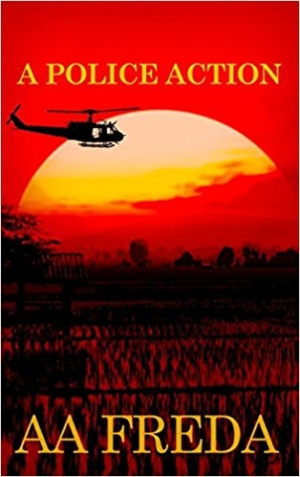A Police Action
A Police Action is a reminder of what the 1960s were really like, for better or worse.
Love conquers all? A Police Action, a new romance from A. A. Freda, seems more interested in technical terms than the sweeter side of the genre. Set in the confusing years of the Vietnam War, the novel captures a distinct time, place, and attitude.
A Police Action focuses on the now-fabled era of the late 1960s. Coppi, a young recruit, falls for Sam, a woman he meets by chance on a night away from his base. From the Summer of Love to the heady, political empowerment of the time, A Police Action feels steeped in history.
A. A. Freda drew heavily from his own memories of that period as a young soldier who served in the Vietnam War. The novel’s realistic, rough dialogue sparkles and brings the characters to life quickly. Rather than pause to explain slang or military jargon, Freda jumps right in. It’s a quick immersion, but effective: within a paragraph or two, it’s easy to keep pace with the language.
The novel’s plot is fast, too, bringing characters on stage quickly and efficiently. No time is wasted introducing the hero and his love interest, but their chemistry stalls in love scenes.
Although A Police Action is billed as a romance, it’s not exactly hot and heavy. Sex, attraction, and even preliminary kissing is kept behind the scenes. Freda gives little time to “lovemaking” and focuses on character instead. Military training procedures are described with more detail than intimate love scenes, and the novel is more attentive to firearms and male bonding than romance. However, as the book presses on, the relationship between Coppi and Sam grows to become the center of the plot.
In some ways, A Police Action is a tacit reminder of a less than progressive America. The novel’s landscape encompasses free love and rock and roll, sure, but there’s also an oppressive attitude toward women and people of color. Sam, for example, decides to get an abortion, with Coppi’s help. Although Coppi doesn’t criticize her, Sam’s inner monologue hints at the repressive, antiwoman culture of the 1960s. After the procedure, Sam “has taken a shower to clean herself of the dirt, but inside the filth lingers.” Unaddressed themes of guilt and freedom pierce the novel.
Coppi and Sam circle one another for many chapters, building anticipation for their final scene. It’s a satisfying ending: extensive world-building creates a sense of relief and an appreciation for what the characters had to go through in order to finally be together.
Well written and historically accurate, A Police Action is a reminder of what the 1960s were really like, for better or worse.
Reviewed by
Claire Foster
Disclosure: This article is not an endorsement, but a review. The publisher of this book provided free copies of the book and paid a small fee to have their book reviewed by a professional reviewer. Foreword Reviews and Clarion Reviews make no guarantee that the publisher will receive a positive review. Foreword Magazine, Inc. is disclosing this in accordance with the Federal Trade Commission’s 16 CFR, Part 255.

